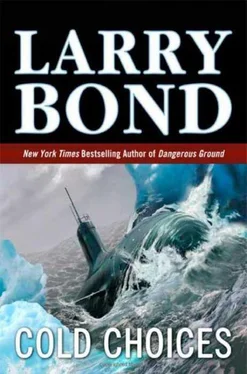Chandler followed Jerry and the XO to the wardroom, with Lavoie and Wolf arriving moments later. Shimko sat down tiredly and the others did the same. Sonar Technician Senior Chief Mike Carpenter, one of the intelligence riders, knocked on the door and then took a seat at the XO’s invitation.
“I asked the Senior Chief to tell us what he can about the Russian submarine — as much as he can, anyway,” Shimko added. Jerry hadn’t seen much of the acoustic intelligence, or ACINT, riders. There were three of them aboard, but they kept to themselves.
Carpenter’s sandy hair made him look younger than his early forties would suggest. As a senior chief, Jerry guessed that he had at least twenty years’ experience listening to Russian submarines. “In this case, sir, it’s pretty much everything we know. We’ve got twenty-eight minutes of recordings that covers the time from our first detection until the collision. She was running at high speed, and using her sonars freely, so we got plenty to work with. In fact, we haven’t gotten through all of it, but we’ve seen enough.”
Carpenter stopped, and the XO waited for a moment before asking him, “For what?” He was impatient, but curious.
“We didn’t get a positive match to anything in our database. That was the funny part. With so much recorded, we figured it would be simple to match his acoustic signature to one of the Northern Fleet’s boats, but it’s definitely not a match, which means it’s Severodvinsk by default, their newest boat. She’s been running trials, but we haven’t heard her before.”
“Given that it was Severodvinsk , does that explain how she found us or what she was doing?”
Carpenter frowned. “No sir, not at all. No transients, no unusual acoustic transmissions. Her sonar suite is the best the Russians have, but nothing exotic, as far as we know. We were a little noisier during the UUV recovery, mostly short mechanical transients, but nothing more than what’s normal for that evolution.”
“Then keep sorting though those recordings. I want to know everything you know.” Carpenter nodded his understanding.
“Mr. Mitchell, what about the electronics?”
“We’ve lost radar and ESM. I was just about to get Mr. Chandler’s report on the radios.” Jerry didn’t need to share his problems with the XO.
Chandler didn’t wait to be asked. “We should be able to get an HF receiver circuit on line by the end of the day, an LF receiver will take a little more time. Chief Morrison said it would take at least six hours, maybe longer. He’s got his people working on a transmitter, but they’re in considerably worse shape.” He shrugged. “The bridge-to-bridge radio works, so if we get in line of sight with another vessel on the surface, we can talk to them.”
Jerry almost laughed. The bridge-to-bridge radio was no bigger than a good-sized walkie-talkie, and would not reach farther than the horizon. Still, they’d need it to communicate when they got back to a friendly port.
“Mr. Wolfe, what about weapons department?”
“All bow arrays are officially gone. As is the TB-16 towed array. Its stowage tube was crushed during the collision. The TB-29, WAA, and HF sonar are on line, torpedo division is ready. Mr. Palmer is preparing to recover LaVerne.”
The XO asked Lavoie, “Engineering?”
“Everything’s on line, sir. The plant took a heckuva shock, but no equipment failures. We’re watching everything very closely.”
The XO absorbed the reports for a moment. “We’ve been hurt, but we are not in danger of losing the boat. We’re ending the mission, of course. As soon as we recover the UUV we’re turning southwest and heading for Faslane.”
Jerry knew the place. On the western coast of Scotland, Faslane was a British submarine base. It was the closest friendly port that could take their injured and make emergency repairs.
“Mr. Mitchell, I’ll need a recommended course as soon as possible.”
“Aye, sir.”
“Mr. Wolfe, you’ll do the death investigation for Petty Officer Rountree.”
“Yes, sir.”
“Mr. Mitchell, start reconstructing the incident, beginning with our initial detection, up to the moment of the collision. You are not writing the incident report — that’s my job — but I want a chronology that may help explain how he found us and what he was trying to do. And I will use it in my report.” Shimko motioned toward Carpenter. “Use whatever the Senior Chief can give you about the Russian’s movements and activities.
“That’s all,” Shimko said, dismissing them.
Jerry hurried back to control. It only took a few minutes to work out the course changes and times for Faslane, Scotland. He arrived at the XO’s cabin just as Shimko was returning.
After Shimko reviewed and approved the route, Jerry said, “Thank you, sir. Should I go brief the Skipper now?” That was standard procedure.
“No, Jerry, I’ll brief him.” That was unusual. Rudel always wanted to be briefed by the officer involved. And it was unnecessary. Rudel’s cabin was right there, a few steps away. And Shimko’s tone was off. He was trying too hard to sound casual.
“Is everything all right, sir? Was the Captain hurt? I noticed he wasn’t at the meeting.” Jerry was deeply concerned. Rudel was more than a commanding officer. Everyone in the crew liked and admired Rudel, and thought of him as a friend, a father, or a favorite teacher.
“He’s fine.” But Shimko said it too quickly, and seemed uncomfortable. Finally, he added, “He’s taken Rountree’s death pretty hard.”
“We all have,” Jerry agreed. But then he added, “He doesn’t think it’s his fault, does he?”
“It’s always the Captain’s responsibility, you know that,” Shimko answered. It was a mantra in the navy, but it didn’t tell Jerry what was wrong with the captain.
A coughing fit yanked Petrov back to consciousness, an acrid scent that made his mouth taste of old tires. Disoriented, he fought to remember where he was. It was dark, but he didn’t recall turning off the reading light in his bunk.
No. That wasn’t right. This wasn’t his cabin. He felt himself lying on the deck, propped up against the command console. His head and right shoulder burned with pain, which became sharper when he tried to pull himself up. As he struggled to stand, he saw the dim glow of the emergency lights.
Everything was wrong. What had happened to the power? The central post was dark, really dark, in the worst possible way. Not only were the lights out, but most of the console displays were dead as well. As his confusion subsided, he felt the sudden loss of information. What was happening throughout the rest of the boat?
He took a cautious first step, but nearly fell anyway. The deck was tilted, down by the bow and sharply to port. They must be resting on the bottom. He coughed again, and smelled what had to be smoke. Fear poured into him, and he searched for other signs of fire. By the time he’d scanned the entire central command post his head was clearing. Thankfully, there didn’t seem to be any flames. But he still had to figure out where that smoke was coming from.
A number of the men were just getting up themselves, some with effort, a sure sign of injury. Others lay crumpled on the deck, unmoving. As Petrov started inching toward the nearest man, he asked himself two questions. How many of my crew are injured? What is the material condition of my boat? He needed answers, and he needed them now.
Chief Engineer Lyachin was just getting up as Petrov climbed over to the ship’s systems-control station. Steadying the wobbly engineer, Petrov was relieved that he did not appear to be seriously hurt. “Sergey Vladimirovich, I need you to go back to the aft compartments and inspect them for damage. Can you walk?”
Читать дальше












